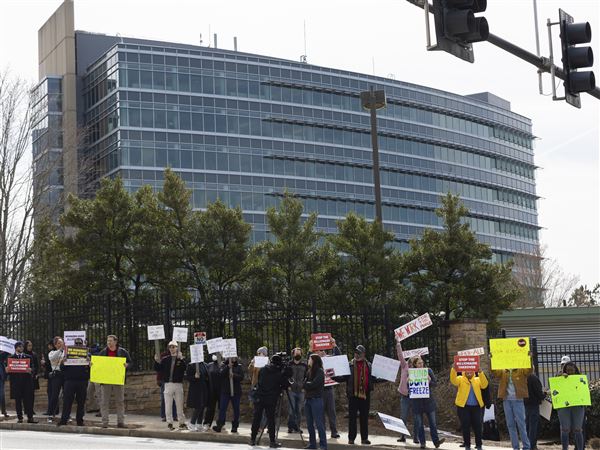After months of negotiations, the Pennsylvania budget debate remains at an impasse. Democratic Gov. Tom Wolf and the Republican-controlled Legislature have been unable to agree on how to close a $2 billion budget deficit. The stalemate has kept millions of tax dollars from flowing to schools and social-service providers, straining nonprofit agencies and educators.
One of the most divisive issues is Mr. Wolf’s proposal to levy a severance tax on the wellhead value of natural gas. The current per-well impact fee has an effective tax rate of less than 2 percent, among the lowest in the nation. Mr. Wolf’s proposal would increase the effective rate to 5 percent, plus an additional 4.7 cents per thousand cubic feet extracted. Mr. Wolf estimates his severance tax would generate $1 billion in its first year, four times the revenue of the impact fee, most of which he has pledged to dedicate to education.
Unsurprisingly, the governor’s proposal has been met with sharp dissent by the Marcellus Shale Coalition trade group, Republicans in the Legislature and natural gas companies with large operations in Pennsylvania, including Chesapeake Energy and Range Resources. Both Senate President Pro Tempore Joe Scarnati and Range Resources CEO Jeffrey Ventura have voiced concern for Pennsylvania’s economy, warning that the tax increase would cause companies to reduce production or relocate.
Both Mr. Wolf and the Republican majorities debate the issue as black and white: Mr. Wolf describes the tax as essential while Mr. Scarnati describes it as devastating. But perhaps there are creative alternatives.
One is tax incentives: Texas, for example, gives companies several ways to earn tax credits and reduce their effective tax rate to 3.5 percent from 7.5 percent. Oklahoma and Louisiana, two of the largest gas-producing states, do the same.
In addition to enacting standard credits for new and low-producing wells, Pennsylvania should consider Texas’ underutilized incentives to protect the environment. Texas offers a credit to companies that recycle water during the fracking process, which is important because fracking an average well requires roughly 5 million gallons of water. Also eligible for tax breaks are companies that use energy-efficient equipment. This incentive has inspired Apache, a Houston-based company, to power its operations with natural gas instead of diesel fuel, cutting its costs and reducing greenhouse emissions.
Pennsylvania lawmakers also should explore tax credits for companies that limit methane pollution while drilling. Methane leakage is unregulated in Pennsylvania, and current leakage rates – estimated at 1 percent to 3 percent per well – negate the carbon-dioxide reduction of burning natural gas instead of coal. Plugging methane involves only a small upfront cost to monitor leaks, which can be reduced by tax exemptions and offset by selling the captured gas.
Of course, offering these incentives might reduce the revenue generated by the governor’s proposal, but this could provide some wiggle room for negotiation with the Legislature. And the incentives, if enacted, would benefit Pennsylvania’s citizens in other ways while encouraging cooperating companies to expand production, generating additional tax revenue.
Energy companies have stimulated Pennsylvania’s economy, created jobs and contributed millions of dollars in taxes and impact fees. But they also have profited from drilling techniques that harm our environment, including methane leakage and groundwater contamination. This is the main reason 47 percent of Pennsylvanians oppose additional fracking in the state. This negative public perception can hobble the industry, limiting its access to lucrative clean-energy markets, for example.
Mr. Wolf wants to devote a portion of severance-tax revenue to the Pennsylvania Department of Environmental Protection for industry oversight, which is fine. He also could direct part of it toward research in sustainable natural-gas extraction. Cleaner extraction could increase Pennsylvania’s gas usage, boost exports and accelerate power-plant transitions from coal to natural gas. With an improved fracking process, there would be more popular support for delivering more natural gas to homes and expanding its use in transportation. Pennsylvania, a leading producer of natural gas, could lead the nation in advancing its sustainable extraction and use.
A solution to the state budget stalemate must balance fiscal responsibility with business growth. Pennsylvania is the only major gas-producing state without a severance tax; let’s be the first to implement one that not only is fair to the industry, but that also adds value for both citizens and producers.
A tax on natural gas is not a zero-sum game, nor should it be an “us vs. them” proposition. We can address the concerns of both our people and the businesses who invest here by looking past partisanship toward creative solutions that benefit us all.
Natalie Morrissey, a native of Pittsburgh, is studying chemical engineering in the Schreyer Honors College at Penn State University. For her undergraduate thesis she is examining collective decision-making processes using engineering principles.
First Published: November 4, 2015, 5:00 a.m.
















